

Table of Contents
- Introduction
- The Importance of Pool Tiles
- 1. Ceramic Pool Tiles
- 2. Porcelain Pool Tiles
- 3. Glass Pool Tiles
- 5. Mosaic Pool Tiles
- 6. Concrete Pool Tiles
- 7. Metal Pool Tiles
- 8. Authentic Pebble Tiles
- 9. Non-Slip Pool Tiles
- Design Considerations
- Popular Tile Patterns
- Cost Considerations for Swimming Pool Tiles in the Indian Market
- Installation Costs
- Additional Costs
- DIY vs Professional Installation
- Conclusion
- Faq's
Introduction
Swimming pools are not just a place for recreation and relaxation; they are also a significant aspect of outdoor aesthetics. One of the most impactful elements in pool design is the choice of tiles. The right tiles can elevate the visual appeal, enhance safety, and complement the overall landscape of your home.
This article delves into various swimming pool tile designs, types, materials, and considerations to help you create the perfect aquatic retreat.
The Importance of Pool Tiles
Tiles serve multiple functions in a swimming pool environment:
Aesthetic Appeal: They can transform a bland pool area into a stunning visual centerpiece.
Safety: Certain tiles provide slip resistance, reducing the risk of accidents.
Durability: High-quality tiles withstand harsh weather conditions and chemical exposure.
Maintenance: The right choice can make upkeep easier and more efficient.
1. Ceramic Pool Tiles
Ceramic tiles are one of the most commonly used materials for swimming pools. Made from clay that is fired at high temperatures, they come in various colors, patterns, and finishes.
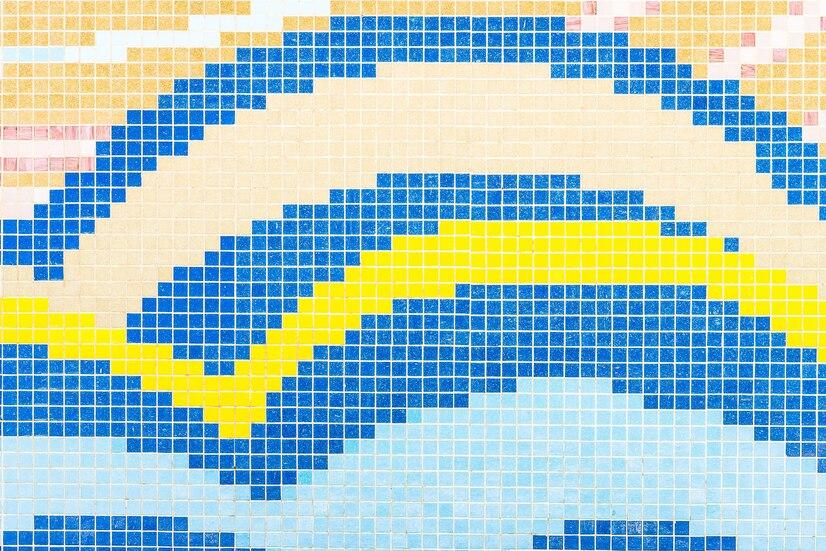 Ceramic Pool Tiles
Ceramic Pool Tiles
Advantages:
Variety: A vast range of designs allows for personalisation.
Durability: Resistant to fading and easy to clean.
Cost-Effective: Generally more affordable than other materials.
Disadvantages:
Porosity: Some ceramic tiles can be porous, leading to water absorption if not properly sealed.
Chipping: They may chip or crack under heavy impact.
2. Porcelain Pool Tiles
Porcelain tiles are denser and less porous than ceramic tiles, making them ideal for pool environments. They can mimic the look of natural stone or wood while offering superior durability.
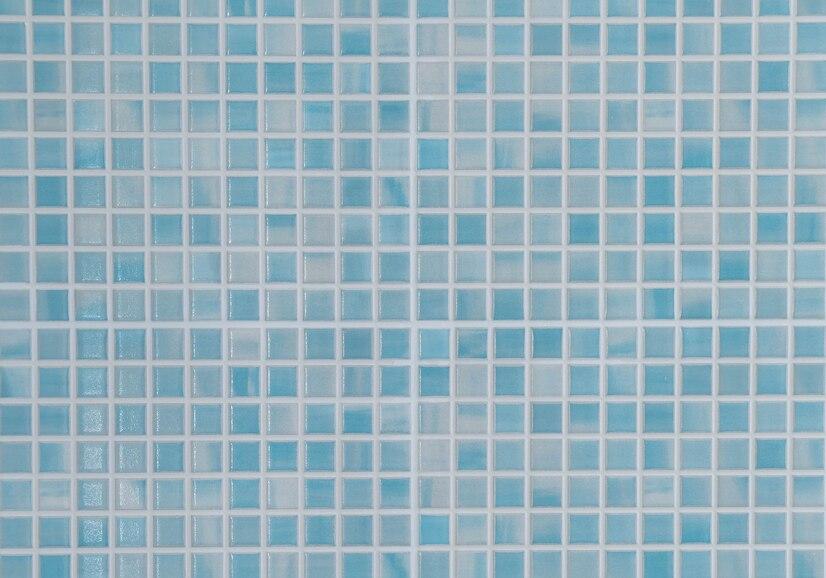 Porcelain Pool Tiles
Porcelain Pool Tiles
Advantages:
Low Water Absorption: Reduces the risk of mold and mildew.
Frost Resistant: Suitable for various climates.
Stain Resistance: Maintains appearance over time.
Disadvantages:
Cost: Generally more expensive than ceramic tiles.
Installation Complexity: Requires skilled labor for proper installation.
3. Glass Pool Tiles
Glass tiles are known for their stunning visual appeal and reflective qualities. They are often used for decorative accents or as waterline tiles.
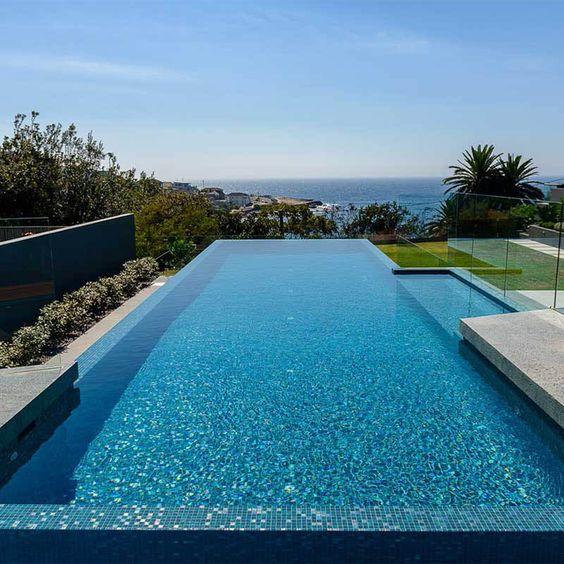 Glass Pool Tiles
Glass Pool Tiles
Advantages:
Aesthetic Appeal: Offers vibrant colors and shimmering effects.
Non-Porous: Resistant to stains and chemicals.
Easy Maintenance: Requires minimal upkeep.
Disadvantages:
Cost: Typically more expensive than ceramic or porcelain.
Installation Difficulty: Requires specialized knowledge for installation.
5. Mosaic Pool Tiles
Mosaic tiles consist of small pieces of glass, ceramic, or stone arranged in intricate patterns. They allow for creative designs that can become focal points in the pool area.
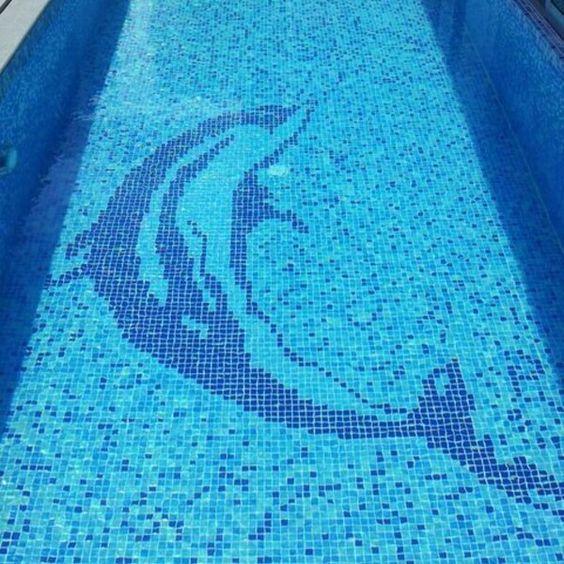 Mosaic Pool Tiles
Mosaic Pool Tiles
Advantages:
Design Flexibility: Can create detailed images or patterns.
Durability: Resistant to water and chemical damage.
Easy Installation: Often comes in sheets for straightforward application.
Disadvantages:
Costly Installation: Intricate designs may require professional installation.
Grout Maintenance: Grout lines may require regular cleaning and sealing.
6. Concrete Pool Tiles
Concrete tiles offer a customisable option that can be poured into various shapes and sizes. They can be textured or stamped to resemble other materials.
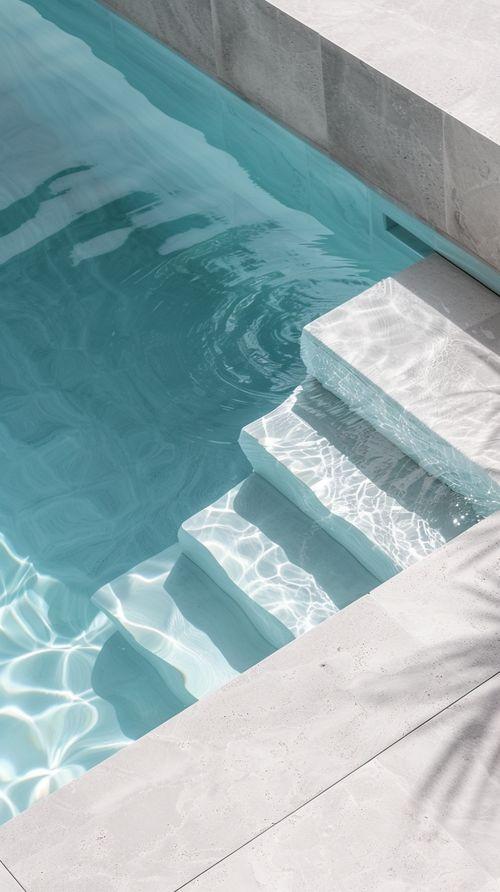
Advantages:
Customisation: Can be tailored to specific design needs.
Cost-Effective: Affordable compared to natural stone or glass.
Versatility: Suitable for various styles.
Disadvantages:
Cracking Risk: May crack over time if not properly installed or maintained.
Surface Texture: Can be rough on bare feet unless smoothed.
7. Metal Pool Tiles
Metal tiles made from materials like stainless steel or copper provide a modern touch to pool designs. They are often used as accents or borders.
Advantages:
Contemporary Look: Adds an industrial feel.
Durability: Corrosion-resistant and long-lasting.
Low Maintenance: Requires minimal upkeep.
Disadvantages:
Heat Retention: Can become hot under direct sunlight.
Costly Material: Generally more expensive than traditional tile options.
Also Read: How to Use Aerators to Reduce Water Usage
8. Authentic Pebble Tiles
Pebble tiles create a unique texture underfoot and are made from small smooth stones embedded in concrete or mesh backing.
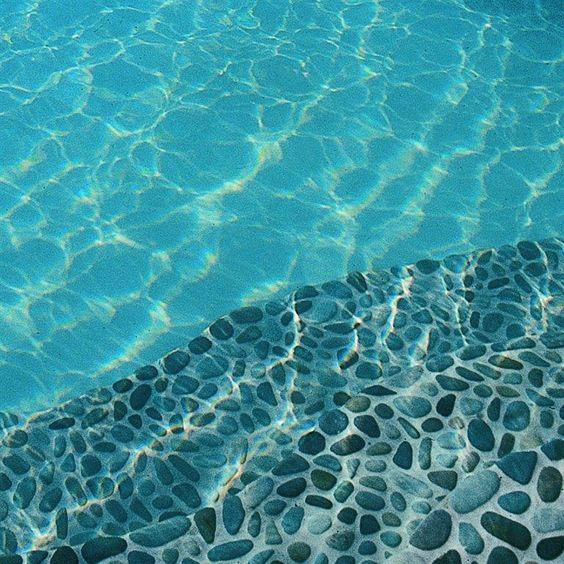
Advantages:
Natural Feel: Comfortable surface for bare feet.
Slip Resistance: Provides good traction around the pool.
Disadvantages:
Cleaning Challenges: Grout lines may trap dirt if not maintained properly.
9. Non-Slip Pool Tiles
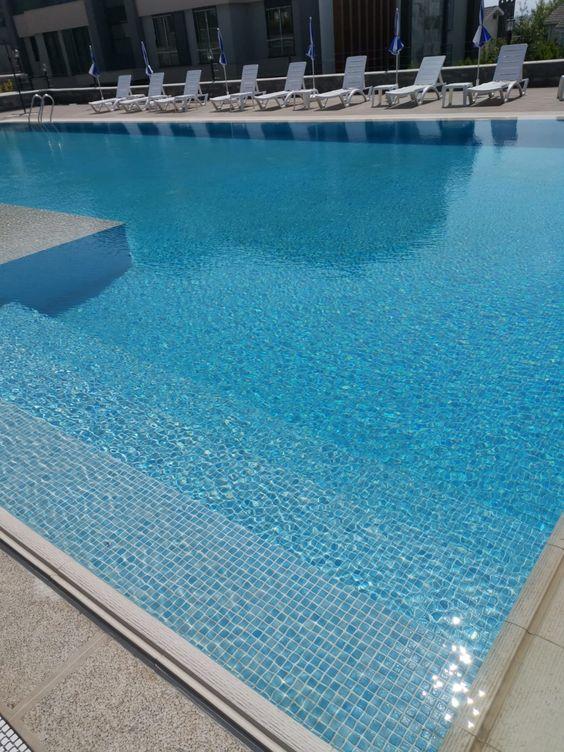 Non Slip Pool Tiles
Non Slip Pool Tiles
Safety is paramount around pools; non-slip tiles are designed with textured surfaces to provide better grip when wet.
Advantages:
Enhanced Safety: Reduces the risk of slips and falls.
Versatile Use: Suitable for decks, steps, and pathways.
Disadvantages:
Limited Design Options: May not offer as many aesthetic choices as smoother tiles.
Design Considerations
When selecting tiles for your swimming pool, several factors should be considered:
Aesthetic Continuity
The tile material should complement the overall design theme of your home and outdoor space. This includes matching colors with existing landscaping or architectural features. For instance, if you have a modern home with clean lines, sleek glass or porcelain tiles may enhance that aesthetic. Conversely, natural stone might suit a more rustic setting better.
Durability
Choose materials that can withstand harsh weather conditions and high foot traffic. For instance, porcelain tiles are recommended for areas exposed to freezing temperatures due to their frost resistance. If you live in an area with extreme weather fluctuations, consider materials that can handle these conditions without cracking or fading
Maintenance Requirements
Consider how much time you are willing to invest in maintenance. Glass tiles may require more frequent cleaning due to their reflective surfaces, while natural stone may need regular sealing to prevent staining. If you prefer low-maintenance options, porcelain or ceramic might be better suited for your needs.
Safety Features
Slip resistance is crucial around pools. Textured tiles can help prevent accidents, especially on steps and benches where visibility may be reduced. Look for non-slip ratings when choosing your tile material; many manufacturers provide this information on their products.
Also Read: Home Security Systems in 2024: Simple, Affordable, and Reliable
Popular Tile Patterns
The arrangement of tiles can significantly impact the overall look of your pool area:
Waterline Tiles
These tiles run along the waterline of the pool and serve both aesthetic and functional purposes by reducing scum buildup while adding a decorative element. Waterline tiles often feature vibrant colors that contrast beautifully with the water's surface.
Floor Patterns
Tiling the pool floor can enhance visual appeal while also providing a non-slip surface for safety. Consider using larger format tiles on the floor to create an illusion of space or smaller mosaic tiles for intricate designs that draw attention underwater.
Accent Tiles
Using different colored or patterned tiles as accents can create stunning visual effects without overwhelming the overall design. Accent borders around steps or spa areas can add elegance while providing clear visual cues about where to enter or exit the pool safely.
Eco-Friendly Tile Options
As sustainability becomes increasingly important in home design, eco-friendly tile options have emerged:
Recycled Glass Tiles
Made from post-consumer glass waste, recycled glass tiles offer an environmentally friendly option without sacrificing beauty. They come in various colors and finishes while contributing to waste reduction efforts.
Natural Stone from Sustainable Sources
Choosing natural stone from certified sustainable sources ensures that your materials are ethically sourced while providing timeless beauty in your pool design.
Cost Considerations for Swimming Pool Tiles in the Indian Market
When planning a swimming pool installation or renovation, one of the most significant factors to consider is the cost of tiles. The price of swimming pool tiles in India varies widely based on material type, size, installation complexity, and regional pricing differences. Understanding these costs can help you make informed decisions that align with your budget and design preferences.
Overview of Tile Costs
Here's a breakdown of the average costs associated with different types of swimming pool tiles in the Indian market:
1. Ceramic Tiles
Ceramic tiles are a popular choice for swimming pools due to their affordability and variety. In India, ceramic pool tiles typically range from ₹50 to ₹150 per square foot. The price can vary based on quality, design complexity, and brand.
Advantages: Affordable, durable, and available in various designs.
Disadvantages: Some may be porous if not properly sealed.
2. Porcelain Tiles
Porcelain tiles are denser and less porous than ceramic tiles, making them ideal for wet environments. Prices for porcelain pool tiles in India generally range from ₹100 to ₹300 per square foot.
Advantages: Highly durable and resistant to water absorption.
Disadvantages: Higher initial cost compared to ceramic options.
3. Glass Tiles
Glass tiles offer a luxurious look and are known for their reflective qualities. In India, glass pool tiles can range from ₹200 to ₹800 per square foot, with intricate designs costing more.
Advantages: Stunning aesthetic appeal and low maintenance.
Disadvantages: Higher cost and requires professional installation.
4. Natural Stone Tiles
Natural stone options like travertine and granite provide an earthy aesthetic but come at a higher price point. In India, prices for natural stone tiles typically range from ₹150 to ₹600 per square foot, depending on the type of stone.
Advantages: Unique textures and colors that enhance visual appeal.
Disadvantages: May require sealing and regular maintenance.
5. Mosaic Tiles
Mosaic tiles are often used for decorative accents in pools. In India, mosaic tile prices can range from ₹200 to ₹1,000 per square foot, depending on design intricacy and materials used.
Advantages: Highly customisable with intricate designs.
Disadvantages: Installation can be labor-intensive and costly.
Installation Costs
In addition to tile costs, installation expenses should also be factored into your budget. Hiring professionals for tile installation typically ranges from ₹100 to ₹500 per square foot, depending on the complexity of the project and regional labor rates.
Additional Costs
Maintenance Products: Over time, you may need sealants or cleaners specific to your chosen tile type. Budgeting an additional 10% of your total tile cost for maintenance products is advisable.
Pool Size Considerations: For a standard-sized pool (approximately 400 square feet), total costs including tiles and installation can range from approximately:
Ceramic: ₹20,000 to ₹60,000
Porcelain: ₹40,000 to ₹120,000
Glass: ₹80,000 to ₹320,000
Natural Stone: ₹60,000 to ₹240,000
Mosaic: ₹80,000 to ₹400,000
DIY vs Professional Installation
Deciding between DIY installation versus hiring professionals depends on your skill level, budget constraints, and project complexity:
DIY Installation
- If you have experience with tiling projects, installing pool tiles yourself can save money on labor costs but requires careful planning:
- Ensure proper surface preparation (cleaning & leveling).
- Follow manufacturer guidelines closely regarding adhesive application & curing times.
- Invest in quality tools (tile cutter, trowel) for best results
Professional Installation
- Hiring professionals ensures high-quality workmanship but comes at an additional cost:
- Professionals have experience handling complex patterns & layouts effectively reducing potential mistakes.
- They will also know local building codes & regulations related specifically to pools a crucial aspect often overlooked by DIYers.
Conclusion
Choosing the right swimming pool tile design involves balancing aesthetics with functionality while considering factors like durability, maintenance requirements, safety features and even eco-friendliness. With options ranging from elegant glass mosaics to rustic natural stones available today there's something out there suited perfectly just waiting for you.
By carefully evaluating each type's advantages/disadvantages along with reflecting upon personal style preferences homeowners can create an inviting oasis that enhances their outdoor living experience while ensuring longevity & beauty throughout years ahead. Whether you are looking for a modern touch or timeless elegance your dream pool awaits.
explore further
Latest from Home Buying Tips
More from Recommendations
Resources
Dwello, for every home buyer, is a way to go from 'I feel' to 'I know', at no extra cost.


